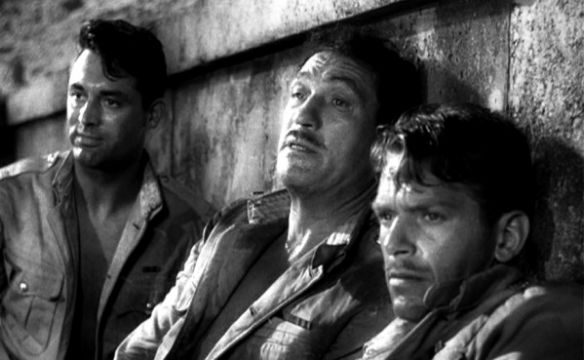Movie Review: Gunga Din (1939)
“STAGED ON A SCALE THAT BEGGARS WORDS!”


Gunga Din (1939)
Director: George Stevens
Cast: Cary Grant, Joan Fontaine, Victor McLaglen
Synopsis: Three British soldiers and a native waterbearer take on the Thuggee cult in Colonial India.
Gunga Din, Rudyard Kipling’s rueful poem about a soldier’s respect for the native Indian who saved his life despite the harsh treatment handed to him as the regiment’s water-bearer provides the inspiration for RKO’s 1939 hit, who transform it into a rousing Boy’s Own adventure in the Indiana Jones mould with a snake pit like the one in Spielberg’s Raiders of the Lost Ark.
Cary Grant (His Girl Friday, The Philadelphia Story), Douglas Fairbanks Jr. (The Three Musketeers, Little Caesar), and Victor McLaglen (Klondike Annie, Rio Grande) are three brawling friends and comrades in the British army in India at the time of the thuggee uprising, who view their skirmishes with natives as something of a lark to be participated in with enthusiastic relish. Bristol-born Grant, and McLaglen, a native of Tunbridge Wells, drop their aitches to deliver unconvincing cockney accents as they conspire to prevent Fairbanks from leaving the army to marry his fiancée, Joan Fontaine (Rebecca, Suspicion) in a plot that barrels along at a thousand miles an hour.
The plentiful action scenes in Gunga Din are often laced with a heavy dose of humour, much of it centred around Annie the elephant. Seeing the doting McLaglen feed Annie a teaspoonful of medicine is a near-surreal highlight, and she goes on to destroy a prison stockade in her efforts to free Grant from its confines, before nearly pitching him and Gunga Din from a rickety wooden bridge spanning a deep chasm in her desire to follow Grant them across. Although his name provides the title of the movie, Gunga Din is little more than a supporting player to the three stars, and the casting of the spindly 47-year-old Sam Jaffe (The Scarlet Empress, Lost Horizon) in the role (Sabu wasn’t available, apparently) is a curious one. Naturally, this being the era of Hollywood’s Golden Age, the treatment of the little Indian man by our three heroes is never as dismissive or harsh as it is in the poem in the same way that Britain’s colonialism is never questioned. Despite this – or, perhaps, because of it, Gunga Din, remains a tremendous example of Hollywood movie-making at its peak.
(Reviewed 1st July 2016)
httpv://www.youtube.com/watch?v=1wIMA9FRFLU


0 Comments